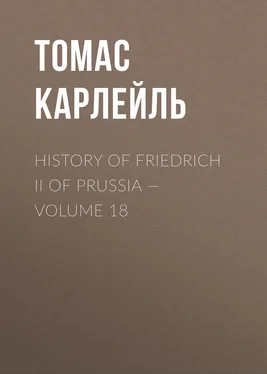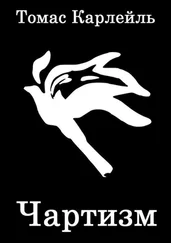Томас Карлейль - History of Friedrich II of Prussia — Volume 18
Здесь есть возможность читать онлайн «Томас Карлейль - History of Friedrich II of Prussia — Volume 18» — ознакомительный отрывок электронной книги совершенно бесплатно, а после прочтения отрывка купить полную версию. В некоторых случаях можно слушать аудио, скачать через торрент в формате fb2 и присутствует краткое содержание. Жанр: foreign_prose, История, literature_19, foreign_edu, foreign_antique, на английском языке. Описание произведения, (предисловие) а так же отзывы посетителей доступны на портале библиотеки ЛибКат.
- Название:History of Friedrich II of Prussia — Volume 18
- Автор:
- Жанр:
- Год:неизвестен
- ISBN:нет данных
- Рейтинг книги:5 / 5. Голосов: 1
-
Избранное:Добавить в избранное
- Отзывы:
-
Ваша оценка:
- 100
- 1
- 2
- 3
- 4
- 5
History of Friedrich II of Prussia — Volume 18: краткое содержание, описание и аннотация
Предлагаем к чтению аннотацию, описание, краткое содержание или предисловие (зависит от того, что написал сам автор книги «History of Friedrich II of Prussia — Volume 18»). Если вы не нашли необходимую информацию о книге — напишите в комментариях, мы постараемся отыскать её.
History of Friedrich II of Prussia — Volume 18 — читать онлайн ознакомительный отрывок
Ниже представлен текст книги, разбитый по страницам. Система сохранения места последней прочитанной страницы, позволяет с удобством читать онлайн бесплатно книгу «History of Friedrich II of Prussia — Volume 18», без необходимости каждый раз заново искать на чём Вы остановились. Поставьте закладку, и сможете в любой момент перейти на страницу, на которой закончили чтение.
Интервал:
Закладка:
Where the Austrian Camp or various Tent-groups were, at the time Friedrich first cast eye on them, is no great concern of his or ours; inasmuch as, in two or three hours hence, the Austrians were obliged, rather suddenly, to take Order of Battle; and that, and not their camping, is the thing we are curious upon. Let us step across, and take some survey of that Austrian ground, which Friedrich is now surveying from the distance, fully intending that it shall be a battle-ground in few hours; and try to explain how the Austrians drew up on it, when they noticed the Prussian symptoms to become serious more and more. By nine in the morning,—some two hours after Friedrich began his scanning, and the Austrian outposts their firing of stray cannon-shots on him,—it is Battle-lines, not empty Tents (which there was not time to strike), that salute the eye over yonder.
From behind that verdant Horse-shoe Chasm we spoke of, buttressed by the inaccessible steeps, and the Moldau, double-folded in the form of Horse-shoe, all along the brow of that sloping expanse, stands (by 9 A.M. "foragers all suddenly called in") the Austrian front; the second line and the reserve, parallel to it, at good distances behind. Ranked there; say 65,000 regulars (Prussian force little short of the same), on the brow of Ziscaberg slope, some four miles long. Their right wing ends, in strong batteries, in intricate marshes, knolls, lakelets, between Hlaupetin and Kyge: the extreme of their left wing looks over on that Horse-shoe Hollow, where Moldau tried to dig his way, but could not and had to turn back. They have numerous redoubts, in front and in all the good places; and are busy with more, some of them just now getting finished, treble-quick, while the Prussians are seen under way. As many as sixty heavy cannon in battery up and down: of field-pieces they have a hundred and fifty. Excellent always with their Artillery, these Austrians; plenty of it, well-placed and well-served: thanks to Prince Lichtenstein's fine labors within these ten years past. [ OEuvres de Frederic, (in several places); see Hormayr,? Lichtenstein.] The villages, the farmsteads, are occupied; every rising ground especially has its battery,—Homoly Berg, Tabor Berg, "Mount of Tabor;" say KNOLL of Tabor (nothing like so high as Battersea Rise, hardly even as Constitution Hill), though scriptural Zisca would make a Mount of it;—these, and other BERGS of the like type.
That is the Austrian Battle Order (as it stood about 9, though it had still to change a little, as we shall see): their first line, straight or nearly so, looking northward, stands on the brow of the Zisca Slope; their second and their third, singularly like it, at the due distances behind;—in the intervals, their tents, which stand scattered, in groups wide apart, in the ample interior to southward. The cavalry is on both wings; left wing, behind that Moldau Chasm, cannot attack nor be attacked,—except it were on hippogriffs, and its enemy on the like, capable of fighting in the air, overhead of these Belvedere Pleasure-grounds: perhaps Prince Karl will remedy this oversight; fruit of close following of the orthodox practice? Prince Karl, supreme Chief, commands on the left wing; Browne on the right, where he can attack or be attacked, NOT on hippogriffs. As we shall see, and others will! Light horse, in any quantity, hang scattered on all outskirts. With foot, with cannon batteries, with horse, light or heavy, they cover in long broad flood the whole of that Zisca Slope, to near where it ceases, and the ground to eastward begins perceptibly to rise again.
In this latter quarter, Zisca Slope, now nearly ended, begins to get very swampy in parts; on the eastern border of the Austrian Camp, at Kyge, Hostawitz, and beyond it southward, about Sterbohol and Michelup, there are many little lakelets; artificial fish-ponds, several of them, with their sluices, dams and apparatus: a ragged broadish lacing of ponds and lakelets (all well dried in our day) straggles and zigzags along there, connected by the miserablest Brook in nature, which takes to oozing and serpentizing forward thereabouts, and does finally get emptied, now in a rather livelier condition, into the Moldau, about the TOE-part of that Horse-shoe or Belvedere region. It runs in sight of the King, I think, where he now is; this lower livelier part of it: little does the King know how important the upper oozing portion of it will be to him this day. Near Michelup are lakelets worth noticing; a little under Sterbohol, in the course of this miserable Brook, is a string of fish-ponds, with their sluices open at this time, the water out, and the mud bottom sown with herb-provender for the intended carps, which is coming on beautifully, green as leeks, and nearly ready for the fish getting to it again.
Friedrich surveys diligently what he can of all this, from the northern verge. We will now return to Friedrich; and will stay on his side through the terrible Action that is coming. Battle of Prag, one of the furious Battles of the World; loud as Doomsday;—the very Emblem of which, done on the Piano by females of energy, scatters mankind to flight who love their ears! Of this great Action the Narratives old and modern are innumerable; false some of them, unintelligible well-nigh all. There are three in Lloyd, known probably to some of my readers. Tempelhof, with criticisms of these three, gives a fourth,—perhaps the one Narrative which human nature, after much study, can in some sort understand. Human readers, especially military, I refer to that as their finale. [In Lloyd, i. 38 et seq. (the Three): in Tempelhof, i. 123 (the Fourth); ib. i. 144 (strength of each Army), 105-149 (remarks of Tempelhof).—The "HISTORY," or Series of Lectures on the Battles &c. of this War, "BY THE ROYAL STAFF-OFFICERS"—which, for the last thirty or forty years, is used as Text-Book, or Military EUCLID, in the Prussian Cadet-Schools,—appears to possess the fit professorial lucidity and amplitude; and, in regard to all Official details, enumerations and the like, is received as of CANONICAL authority: it is not accessible to the general Public,—though liberally enough conceded in special cases; whereby, in effect, the main results of it are now become current in modern Prussian Books. By favor in high quarters, I had once possession of a copy, for some months; but not, at that time, the possibility of thoroughly reading any part of it.] Other interest than military-scientific the Action now has not much. The stormy fire of soul that blazed that day (higher in no ancient or modern Fight of men) is extinct, hopeless of resuscitation for English readers. Approximately what the thing to human eyes might be like; what Friedrich's procedure, humor and physiognomy of soul was in it: this, especially the latter head, is what we search for,—had lazy Dryasdust given us almost anything on this latter head! What little can be gleaned from him on both heads let us faithfully give, and finish our sad part of the combat.
Friedrich, with his Schwerin and Winterfeld, surveying these things from the northern edge, admits that the Austrian position is extremely strong; but he has no doubt that it must be, by some good method, attacked straightway, and the Austrians got beaten. Indisputably the enterprise is difficult. Unattackable clearly, the Austrians, on that left wing of theirs; not in the centre well attackable, nor in the front at all, with that stiff ground, and such redoubts and points of strength: but round on their right yonder; take them in flank,—cannot we? On as far as Kyge, the Three have ridden reconnoitring; and found no possibility upon the front; nor at Kyge, where the front ends in batteries, pools and quagmires, is there any. "Difficult, not undoable," persists the King: "and it must be straightway set about and got done." Winterfeld, always for action, is of that opinion, too: and, examining farther down along their right flank, reports that there the thing is feasible.
Читать дальшеИнтервал:
Закладка:
Похожие книги на «History of Friedrich II of Prussia — Volume 18»
Представляем Вашему вниманию похожие книги на «History of Friedrich II of Prussia — Volume 18» списком для выбора. Мы отобрали схожую по названию и смыслу литературу в надежде предоставить читателям больше вариантов отыскать новые, интересные, ещё непрочитанные произведения.
Обсуждение, отзывы о книге «History of Friedrich II of Prussia — Volume 18» и просто собственные мнения читателей. Оставьте ваши комментарии, напишите, что Вы думаете о произведении, его смысле или главных героях. Укажите что конкретно понравилось, а что нет, и почему Вы так считаете.









